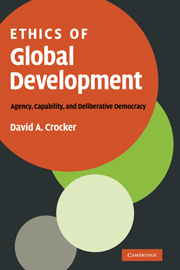Book contents
- Frontmatter
- Contents
- List of figures
- Acknowledgments
- 1 Introduction
- Part I Development ethics
- Part II The capability approach: ethical foundations
- 4 Critique of alternatives
- 5 Agency, functioning, and capability
- 6 Evaluating capabilities and functionings
- Part III Strengthening and applying the capability approach
- Part IV Deliberative democracy, participation, and globalization
- Index of names
- Index of subjects
6 - Evaluating capabilities and functionings
Published online by Cambridge University Press: 22 September 2009
- Frontmatter
- Contents
- List of figures
- Acknowledgments
- 1 Introduction
- Part I Development ethics
- Part II The capability approach: ethical foundations
- 4 Critique of alternatives
- 5 Agency, functioning, and capability
- 6 Evaluating capabilities and functionings
- Part III Strengthening and applying the capability approach
- Part IV Deliberative democracy, participation, and globalization
- Index of names
- Index of subjects
Summary
Sen and Nussbaum both conceive good social and economic development as, inter alia, social change that promotes valuable capabilities and functionings, but the two development ethicists have importantly different conceptions of the evaluative exercise and the status of its results. In this chapter I ask and seek to answer several questions about Sen's and Nussbaum's respective views concerning the evaluation of human capabilities and functionings.
First, what is the result of Sen's and Nussbaum's evaluative exercises? Sen defends the “evaluative space” of capability and functioning; but, while he provides examples of capabilities and functionings that people have reason to value, he himself does not offer a “pre-determined, canonical list” of (universally valid) capabilities or functionings. In contrast, Nussbaum offers just such a list. What is the content of Nussbaum's list? How and how well does she defend it? Why does Sen argue against such a list? Finally, who do Sen and Nussbaum claim should evaluate functionings and capabilities and what methods should they employ? Here one finds a sharp and growing disagreement between Sen and Nussbaum. Nussbaum emphasizes philosophical theorizing in determining valuable capabilities while Sen stresses agency-manifesting processes of public discussion and democratic choice. How should we understand and assess this dispute? Finally, what view does each thinker hold with respect to the range of evaluations? For Sen, with his focus an individual's personal advantage or “wellness,” functionings/capabilities range in value from the trivial to the most valuable.
- Type
- Chapter
- Information
- Ethics of Global DevelopmentAgency, Capability, and Deliberative Democracy, pp. 185 - 214Publisher: Cambridge University PressPrint publication year: 2008



